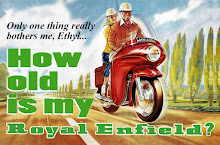Whenever it's discussed, the Dreamliner's looks are compared to a frog or a Messerschmidt microcar.
This year it popped up on the Hitchcocks Motorcycles message board when one member asked whatever happened to the experimental Dreamliner fairing.
The conversation brought the answer to that question and much more.
 |
| The Royal Enfield Dreamliner under test for The Motor Cycle magazine. |
"This had been a rather futuristic experiment with full front and rear enclosure, widely spaced dual headlights and a deep screen," writes Roy Bacon in his book "Royal Enfield, The Postwar Models."
But it did the job.
"Tests had indicated a top speed improvement of 11 per cent and fuel consumption down by some 25 to 35 per cent, depending on the machine's speed," Bacon notes.
The more I look at the Dreamliner the more I think it resembles a motorcycle sidecar with the motorcycle inside the sidecar!
Well, surprise: it turns out that the Dreamliner concept originated with sidecars.
In "Watts My Line, The Life and Work of Editorial Artist Lawrie Watts," author David Dixon explains that the talented Watts created a streamlined Watsonian sidecar for sidecar racing champion Eric Oliver.
Oliver went on to win four successive sidecar championships and The Motor Cycle's editor, Harry Louis, took notice. He asked Watts to design streamlining for a road motorcycle, and set up a connection with Royal Enfield development engineer Tony Wilson-Jones.
 |
| Lawrence Watts rides his Dreamliner in photo from the book "Watts My Line" by David Dixon. |
This required much greater front-end width to allow the front wheel to turn lock-to-lock inside the fairing when parking — the only time it would have to do so.
"That extra width penalized us in order to satisfy a maneuverability requirement at zero miles per hour!" Watts told Dixon.
The streamlined 350cc Bullet still gained 7 mph top speed and even struggled less on hills despite carrying an extra 45 pounds.
And it was practical. Two people working together could remove all the bodywork in 60 seconds; one person doing it alone just took a bit longer. Watts praised the motorcycle for the weather protection it offered.
The Dreamliner influenced the partial fairings Royal Enfield would go on to offer the public.
These production "Airflow" fairings did not fully enclose the front wheel. They were not big sellers, as the riders of the day lost interest in enclosure when international racing banned fairings.
With racing heroes now riding naked motorcycles, the cafe racer look became popular, dooming the plastic — but fantastic — streamliners.
On the Hitchcock's Message Board, member "Richy" came forward to say he is the owner of Lawrence Watt's Dreamliner fairing and Bullet motorcycle, and they will be restored "as a tribute to his work."
Then, in October, member David S. revealed that he owns a related Royal Enfield Meteor Minor 500cc twin that had carried experimental "Airflow Super" fairings. This motorcycle has lost its front fairing but still has the rear bodywork and David S. said he hopes to restore it eventually.
A similarly equipped 250cc Crusader is said to have been purchased by a Japanese collector.

























That alien look...
ReplyDeletehttp://myroyalenfields.blogspot.com/2010/08/alien-enfield.html
The other rider pictured on KAB753 is The Motor Cycle journalist /test rider Vic Willoughby
ReplyDelete